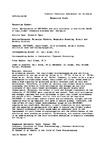Upregulation of CBF/DREB1 and cold tolerance in artificial seeds of cauliflower (Brassica oleracea var. botrytis)
| dc.contributor.author | Fuller, MP | |
| dc.contributor.author | Rihan, Hail | |
| dc.contributor.author | Al-Issawi, M | |
| dc.date.accessioned | 2017-08-01T10:37:43Z | |
| dc.date.issued | 2017-11-18 | |
| dc.identifier.issn | 0304-4238 | |
| dc.identifier.issn | 1879-1018 | |
| dc.identifier.uri | http://hdl.handle.net/10026.1/9657 | |
| dc.description.abstract |
An effective protocol for cauliflower micropropagation and artificial seed production was optimized and applied in this study. However, in order to be a viable alternative to traditional seeds, cauliflower artificial seeds need to show a high capacity to withstand abiotic stresses such as cold and desiccation. Therefore, in order to increase cauliflower abiotic stress tolerance, the effect of cold acclimation and drought on the cold tolerance of both cauliflower microshoots and mature plants were investigated. Moreover, the effect of cold and drought treatments on the induction of CBF/DREB1 gene regulation was tested. Both cold acclimation and drought improved the cold tolerance in both cauliflower microshoots and mature plants. However, whilst cold acclimation up-regulated CBF/DREB1 in cauliflower mature plants and microshoots, drought had the capacity only to up-regulate this gene in mature plants. Therefore, the high effect of cauliflower developmental stage on the CBF/DREB1 regulation was confirmed. Moreover, a small reduction in soil moisture had the capacity to unregulated this gene in mature cauliflower plants. The results presented in this study have an important role in the improvement of cauliflower micropropagation and the effectiveness of the artificial seed production protocol. Furthermore, the results contribute to an understanding of the cold tolerance mechanism in Brassica oleraceae var botrytis. | |
| dc.format.extent | 299-309 | |
| dc.language | en | |
| dc.language.iso | en | |
| dc.publisher | Elsevier BV | |
| dc.subject | CBF/DREB1 | |
| dc.subject | Cauliflower | |
| dc.subject | Cold tolerance | |
| dc.subject | Abiotic stress | |
| dc.subject | Artificial seed | |
| dc.subject | Micropropagation | |
| dc.title | Upregulation of CBF/DREB1 and cold tolerance in artificial seeds of cauliflower (Brassica oleracea var. botrytis) | |
| dc.type | journal-article | |
| dc.type | Journal Article | |
| plymouth.author-url | https://www.webofscience.com/api/gateway?GWVersion=2&SrcApp=PARTNER_APP&SrcAuth=LinksAMR&KeyUT=WOS:000412606900039&DestLinkType=FullRecord&DestApp=ALL_WOS&UsrCustomerID=11bb513d99f797142bcfeffcc58ea008 | |
| plymouth.volume | 225 | |
| plymouth.publication-status | Published | |
| plymouth.journal | Scientia Horticulturae | |
| dc.identifier.doi | 10.1016/j.scienta.2017.07.017 | |
| plymouth.organisational-group | /Plymouth | |
| plymouth.organisational-group | /Plymouth/Faculty of Science and Engineering | |
| plymouth.organisational-group | /Plymouth/Faculty of Science and Engineering/School of Biological and Marine Sciences | |
| plymouth.organisational-group | /Plymouth/REF 2021 Researchers by UoA | |
| plymouth.organisational-group | /Plymouth/REF 2021 Researchers by UoA/UoA06 Agriculture, Veterinary and Food Science | |
| plymouth.organisational-group | /Plymouth/Users by role | |
| plymouth.organisational-group | /Plymouth/Users by role/Academics | |
| dcterms.dateAccepted | 2017-07-11 | |
| dc.rights.embargodate | 2018-7-19 | |
| dc.identifier.eissn | 1879-1018 | |
| dc.rights.embargoperiod | Not known | |
| rioxxterms.versionofrecord | 10.1016/j.scienta.2017.07.017 | |
| rioxxterms.licenseref.uri | http://www.rioxx.net/licenses/all-rights-reserved | |
| rioxxterms.licenseref.startdate | 2017-11-18 | |
| rioxxterms.type | Journal Article/Review |


